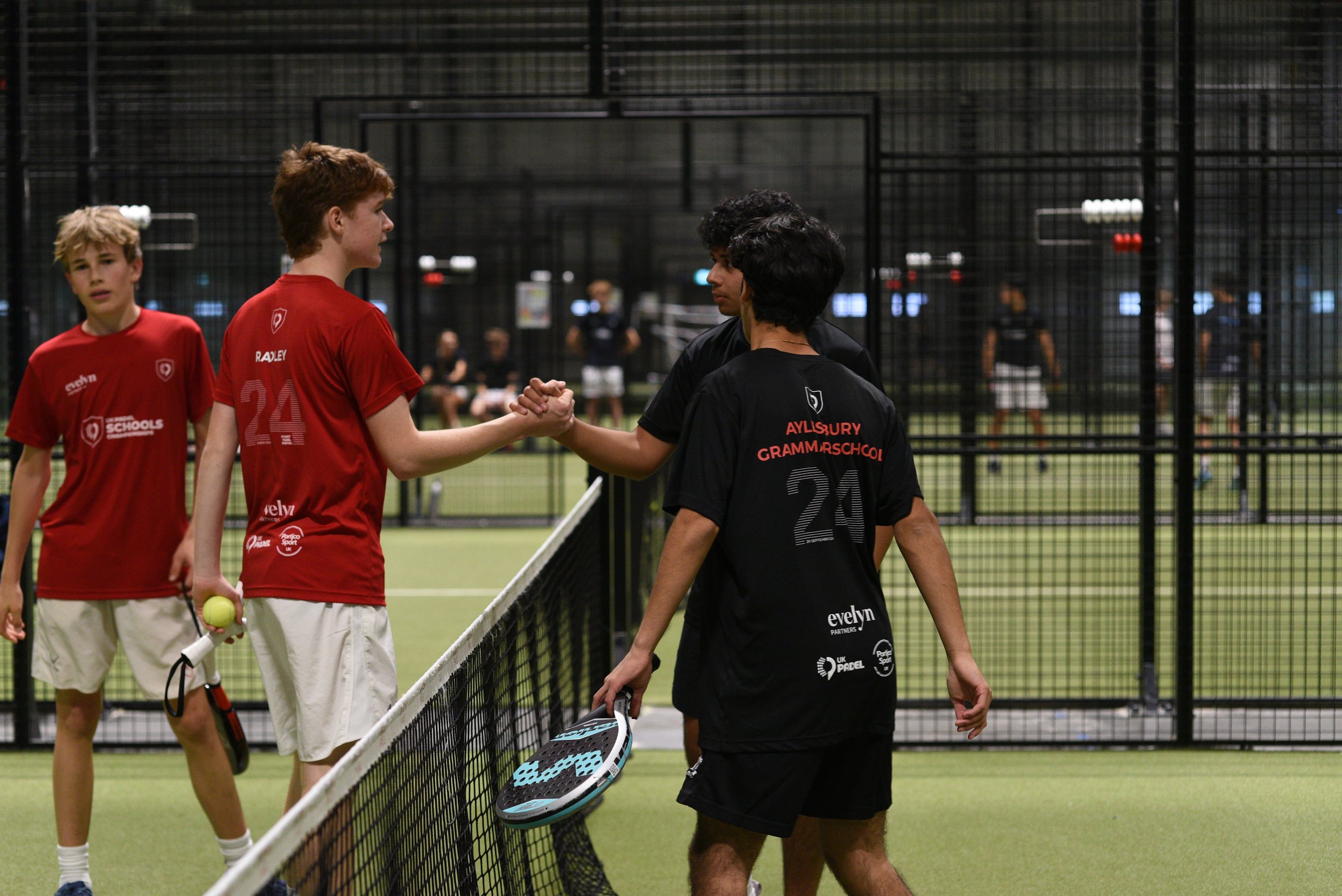THE FOCUS
UK Padel:
“Golf clubs are really starting to embrace padel”
Neil Percival, the Chief Operating Officer and co-founder of UK Padel, believes golf clubs could help bolster the growth of his sport

ONE of GBQ’s goals is to look beyond golf and consider what can be taken from the experiences and learnings of other sports. This month, we investigate padel, which is among the fastest-growing racket sports on the planet and has some intriguing synergies with golf.
Take-up in the UK has been slower than in many other parts of the world but that is now changing. For the past five years, UK Padel has been helping to increase the profile of the sport by making more facilities available and espousing the health and social benefits of playing.
We caught up with Chief Operating Officer and co-founder Neil Percival to discuss UK Padel's ambitions and the progress made so far.

When and why was UK Padel established?
We set up in 2020, and our ambition was to open clubs and allow people to get a taste of padel. I think often when people see a padel court they ask, 'What is it?'. It looks like tennis, but it's not quite tennis. It looks like squash with the walls, but it's not squash either. We want to raise the profile of padel, make people aware of what it is and really push the idea of it as a fun form of exercise.
What sort or profile did padel have when you started?
There were around 60 to 70 courts in the country, and a number of those were private or behind red brick walls in terms of only being accessible to members. There was a general resistance to it, and people described it as short tennis. It wasn't regarded as an acceptable form of tennis. It effectively became recognised as a form of tennis, and therefore a sport, in the UK in 2020, so we're talking less than five years – put that into the context of the 500-year history of golf as we know it, and you can see how far padel has to go.
What is the typical model for the clubs you operate?
All of the operations that we run are public access rather than private clubs. The idea is that people don't know that they want to play padel yet because either they've not seen it or maybe they've seen it on Instagram but there's no clear understanding of what it is and how to get involved. There's a lack of status around it and no real role models as yet, which is something we're looking to address.
Padel at golf clubs?
The search for new locations to establish padel facilities has broadened in recent years to include golf clubs.
Percival revealed there had been a marked increase in the number of golf venues looking into the prospect of building padel courts on their grounds.
UK Padel recently opened new courts at South Buckinghamshire Golf Club to underline the growing trend.
"Golf clubs are really starting to embrace this idea," he said. "From what we've seen, everybody is asking for a proposal and they're asking the questions – what does it look like? What's involved? What do you need from a planning and operational point of view?
"They want to know about sound issues and whether you can have a padel court within 100 metres of the 1st tee without disturbing the golfers (the answer is yes!). All of that shows there's a genuine interest and golf clubs could be a huge area of growth for padel in the UK."
“Padel effectively became recognised as a form of tennis and therefore a sport in the UK in 2020, so we're talking less than five years – put that into the context of the 500-year history of golf as we know it and you can see how far we have to go”
How did you go about defining your likely target market?
We spent a lot of time contacting people who we thought were like-minded, and this is something with some interesting parallels to golf where you might look at people who go to driving ranges versus people who go to golf clubs, for example. We thought the lowest hanging fruit was to go to tennis clubs and squash clubs, but if you look at who is coming to play padel now it's often 20 to 30-year-olds who are looking for a way to socialise with their friends while they exercise, which is a great story for padel.
What other demographics have been drawn to the sport?
We have had a range of people who come and say, 'I've retired from squash', or, 'I've retired from tennis, my body's shot' – they are the people who would really take off with padel. They enjoy the fact it's a bit less intensive – and it's all in context because it can be extremely intensive once you get very good at it – the ball sits up well, you have the use of the glass and time to move and so on. There's still a lot of scepticism around it as an elite sport but it's a wonderful competition sport, and as a social, engaging, community sport it's got real legs and real value.
How much of a priority is the younger demographic and how do you tailor the offering to them?
We've got youth events running all the way through to the last week of November, so it's something that's really front and centre for us. We want to get the message across that this is a game that is accessible for all kids, including those who might not see themselves as 'sporty'. You really can just pick up a racket and start playing.
We talk through the fundamentals and make it clear you don't need to think about it as tennis, even though there is a net. The service is underarm and you drop the ball on the floor before striking it, whereas in tennis, squash or badminton you need to hit it in the air. It means you don't need to worry about getting started, and that's quite a difference to golf, where standing on the 1st tee can be one of the loneliest places on the planet!
We also focus on the smaller courts and how cool those spaces are, with often vibrant colours, and the rackets look good. It's just trying to elevate the experience and highlight the fun side of it, as well as how accessible it is. We want to give people a starting point and allow them to find their own journey with it.
The fact that you will see a six-year-old on a court and you might see an 80-year-old on a court is another thing in common with golf. There's not an age barrier to it, which is a really lovely and heartwarming thing.
What is padel tennis?
About
Padel is one of the world's fastest growing racket sports. It's becoming increasingly popular in Northern Europe and the USA and is well established in countries like Spain and Argentina, where there are many padel courts and active players. It combines elements of tennis, squash and badminton.
Gameplay
Played on a small, enclosed court, padel is usually played in doubles but can also be played on singles courts. Players hit a ball over a net into the opponent's side but can also hit the ball off the walls that surround the court.
Equipment
Padel is played with solid, stringless rackets, or padels, and balls that are slightly less pressurised than tennis balls.
Scoring
Padel uses the same scoring system as tennis.
Court
Padel courts are about a third of the size of a tennis court and are usually made with steel frames and reinforced glass walls.
“It's about getting the activator community together”
Assembling a pool of qualified coaches continues to be a challenge. There have been numerous clubs we've heard of throughout the country who haven't been able to offer coaching sessions because of a lack of qualified staff. The crossover from tennis is the most obvious area to look at, and there has been a period of time where LTA-qualified tennis coaches have been allowed to coach padel at LTA-sanctioned venues. I think it's about getting the activator community together who can come and help with the basic sessions and then create this opportunity for more advanced coaching.
“The idea is that people don't know that they want to play padel yet”
You mentioned a number of junior events running throughout the year – what format do they take?
We have UK Padel Youth Tour events, with regional competitions involving pairs who will work their way through a traditional knock-out draw. In November, we'll have the UK Padel Junior County Championships, and we know we're able to bring people together by having those regionalised formats. It was harder when there were fewer facilities and more travelling was involved, but with more courts available it's helping to limit that travel element to a regional level, and we see more of the same players at our events now.
Throughout the year we have a number of school events and the UK Padel Schools Championships in October, which is a national event. That helps to raise the profile and get the support of the county associations. It also provides a platform for those who do excel at padel to play in a competitive environment, as they might not be entirely won over by the idea of just playing for the fun of it.
How much engagement has there been with sponsors?
It's been really positive. We worked with a major asset manager, Evelyn Partners, who fully funded the participation of the schools in an event we ran in September 2024 at the biggest club in the UK called Rocket Padel. There's a lot of interest in supporting the growth of the game. We're talking to sports clothing and padel manufacturers and the obvious brands that want to get involved, but we're also talking to organisations who deploy their funds in programmes to help bolster participation and they've been supportive. I think the opportunities are there and the future is bright.
What does that future look like?
We're happy that people talk about it and accept that it's one of the world's fastest-growing sports, with over 25 million players worldwide, but we think that there are well under 200,000 in the UK. We believe it's got a lot of the qualities to be one of the best sports to engage as wide a range of people as possible. It's not just about people with money to buy memberships or to hire a court, and it's not about who is the most athletic – it's really a wide-ranging sport that we think will allow people to develop fitness, have fun and socialise.

“As a social, engaging, community sport it's got real legs”

Get golf business insights straight to your inbox
Sign up for the first look at the latest news, features, exclusive interviews and podcast episodes with our monthly newsletter


